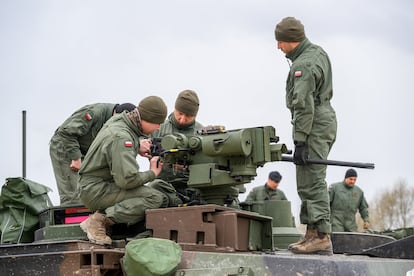Atomic bombs and landmines: European countries debate their red lines for dealing with Russia
Germany, Poland, and Lithuania have expressed interest in a French nuclear umbrella amid concerns about US protection

The war in Ukraine and Donald Trump’s return to the White House are redefining defense policies in northern and eastern Europe. The U.S. president’s threats to ignore his commitments to his allies across the Atlantic have fueled the most in-depth debate on nuclear weapons in Europe in decades. France is willing to put its nuclear arsenal at the service of its partners on the continent; Germany, Poland, Denmark, and Lithuania have all shown some interest in French bombs. At the same time, in another attempt to expand their room for maneuver against the threat from Moscow, all EU countries bordering Russia will withdraw from the landmine treaty to strengthen their capabilities against potential aggression.
More than three years of the Kremlin’s full-scale invasion of Ukraine have heightened nuclear tensions in Europe. Russia has reformed its doctrine to respond to conventional attacks with its atomic arsenal, part of which has been transferred to Belarus, has threatened to use tactical nuclear weapons in Ukraine, and has placed its military’s “deterrent forces” on high alert. The recent rapprochement with the United States — which has maintained its nuclear umbrella in Europe for more than 70 years — the reduction in military support for Ukraine, and the contempt with which the Trump administration treats its NATO allies have caused several European capitals to consider alternatives to dependence on the world’s leading power for defense.
“We would be safer if we had our own nuclear arsenal,” Polish Prime Minister Donald Tusk told the Polish parliament in March. His reason was “a profound change in American geopolitics.” “In any case, the road to this would be very long and there would have to be a consensus,” Tusk clarified, in a speech that, rather than proposing that Warsaw develop an atomic bomb, seemed to respond to the offer Emmanuel Macron had made two days earlier. The French president proposed “a strategic debate on the use of French nuclear deterrence” to extend its protection to European allies.
Astrid Chevreuil, a researcher at the Center for Strategic and International Studies (CSIS), emphasizes that Macron’s vaguely concrete offer is not new. The French president, who has repeatedly mentioned “the European dimension of France’s vital interests,” made a similar announcement in early 2020. “Then it fell on deaf ears, because the Covid pandemic broke out immediately afterward, and it was at a time when it was widely expected that Joe Biden would replace Trump in the White House,” Chevreuil maintains. This time, with the war in Ukraine and threats from Washington as a backdrop, things have been quite different. Even before Macron spoke, conservative Friedrich Merz, who will become German chancellor in May, called during the final stretch of the election campaign for the start of talks with France and the United Kingdom on “how to complement the American nuclear shield.”
Denmark, Lithuania, and Latvia also welcomed Macron’s proposal. “It’s not something we’re working on, but right now we need all options to be on the table,” said Danish Prime Minister Mette Frederiksen. Lithuanian President Gitanas Nauseda praised “a very interesting idea” that offers “great prospects.” And Latvian Prime Minister Evika Silina called it “an opportunity worth discussing.”
Since NATO’s founding in 1949, the Alliance’s nuclear deterrent has fallen to the United States. Germany, Italy, the Netherlands, Belgium, and Turkey host U.S. nuclear weapons. The Trump administration has not specifically threatened to withdraw its nuclear warheads from Europe, but it has threatened to significantly reduce the number of U.S. troops stationed on the continent and to renege on its commitment to defend its NATO allies in the event of aggression.
A complex and obstacle-filled process
Replacing the U.S. nuclear shield with a French — or Franco-British — one would be a complex, costly, and obstacle-ridden process. Atomic weapons from the EU’s sole nuclear power can only be launched from French-made aircraft or submarines. And Macron made it clear that the decision to use such weapons “has always been, and will always be, up to the President and Commander in Chief of France.”
Cédric Perrin, chairman of the French Senate’s Foreign Affairs and Defense Committee, proposed that European allies interested in expanding France’s nuclear deterrent contribute to the costs of maintaining France’s nuclear arsenal, which in 2024 will exceed €5.8 billion.
Unlike France, the United Kingdom’s nuclear forces rely heavily on the United States for weapons design, manufacturing, and maintenance. Furthermore, its nuclear-capable ballistic missiles can only be launched from submarines.
Chevreuil believes that any discussion in Paris — or London — about the possibility of extending its nuclear deterrent will focus on preventing the Trump administration from reacting by withdrawing its forces from the continent. He believes he will face the challenge of “appearing credible, both to his allies and to Russia.” A transfer of French nuclear weapons would also run into legal obstacles: Paris would have to withdraw from the Nuclear Non-Proliferation Treaty, and in some countries, such as Lithuania, constitutional reform would be necessary to host them.
While nuclear weapons are being debated behind closed doors in several European capitals, all EU members that share a border with Russia are accelerating their plans to withdraw from the Ottawa Treaty, which prohibits the manufacture, use, stockpiling, and transfer of anti-personnel mines. Poland, Lithuania, Latvia, and Estonia announced on March 19 that they will withdraw this year. Finland followed suit two weeks later. On Tuesday, Karlis Neretnieks, a retired general and director of Sweden’s National Defense College, called on Sweden to also withdraw from the Ottawa Treaty and acquire anti-personnel mines as soon as possible.
Norway, the only NATO member other than the EU that borders Russia, maintains its ban on these types of mines and rejects the measure adopted by its allies. “If we start weakening our commitment, we make it easier for these weapons to be used again in conflicts around the world, because we reduce the stigma,” declared Barth Eide, the Norwegian Minister of Defense. Amnesty International and Human Rights Watch have also harshly criticized the step taken by Poland, Finland, and the Baltic countries.
Kalev Stoicescu, chairman of the Estonian Parliament’s Defense Committee, justified the controversial measure over the phone: “If we have to stop invading hordes, as we see them fighting in Ukraine, we will be ready to use these, so to speak, inhumane means.” Stoicescu, who was ambassador to the United States and Canada when the convention was signed in 1997 in Ottawa, maintains that Estonia wants to have “a free hand” to confront “the threat posed by Russia and Belarus.”
Fear of Moscow led Poland, Finland, and the Baltic countries to become the last EU members to sign the Ottawa Convention. Vilnius, Tallinn, and Riga did so between 2003 and 2005; Helsinki and Warsaw did not ratify it until 2012. In addition to initiating the procedure to lift the ban on anti-personnel mines, Lithuania formally withdrew in March from the Convention on Cluster Munitions, to which Poland, Finland, Estonia, and Latvia never acceded.
Sign up for our weekly newsletter to get more English-language news coverage from EL PAÍS USA Edition
Tu suscripción se está usando en otro dispositivo
¿Quieres añadir otro usuario a tu suscripción?
Si continúas leyendo en este dispositivo, no se podrá leer en el otro.
FlechaTu suscripción se está usando en otro dispositivo y solo puedes acceder a EL PAÍS desde un dispositivo a la vez.
Si quieres compartir tu cuenta, cambia tu suscripción a la modalidad Premium, así podrás añadir otro usuario. Cada uno accederá con su propia cuenta de email, lo que os permitirá personalizar vuestra experiencia en EL PAÍS.
¿Tienes una suscripción de empresa? Accede aquí para contratar más cuentas.
En el caso de no saber quién está usando tu cuenta, te recomendamos cambiar tu contraseña aquí.
Si decides continuar compartiendo tu cuenta, este mensaje se mostrará en tu dispositivo y en el de la otra persona que está usando tu cuenta de forma indefinida, afectando a tu experiencia de lectura. Puedes consultar aquí los términos y condiciones de la suscripción digital.









































